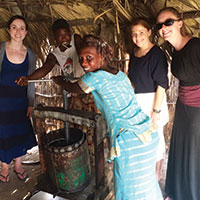


Whether engineering a nutcracker to allow Senegalese women to press and sell a highly desirable nut oil or gathering market data on the need for an inexpensive gastric cancer test in the middle of Honduras, Vanderbilt students involved in Project Pyramid have proven the viability and value of social enterprise.
Now they’re moving it to a new level.

The result is the Turner Family Center for Social Ventures, a new hub for coordinating social enterprise activities at Vanderbilt. The center, established with a $1.2 million gift over five years from the Cal Turner Family Foundation, seeks to go beyond the success of Project Pyramid and serve as a resource and thought leader for people from all Vanderbilt schools interested in combining revenue-generating businesses with social impact objectives.
Wish list
In spring 2014, Dean Eric Johnson asked Project Pyramid alumni to envision how the social venture curriculum, activities and resources at Owen might be expanded to maximize their impact on Vanderbilt students university wide and in the world.In response, the alumni proposed:
- Initiating local and regional projects that address poverty closer to home
- Expanding classroom offerings focused on businesses that create a positive social impact
- Increasing student opportunities to work with global organizations dedicated to finding market-based solutions for alleviating poverty
- Allowing more students to travel domestically and internationally each year to work on social ventures
They also suggested establishing an annual conference that would convene students, thought leaders and executives to share best practices and research on social enterprise, as well as adding to existing career service resources to provide additional internship and job opportunities for students across schools.

With Johnson’s blessing, the alumni shared these ideas with philanthropist and business leader Cal Turner Jr., former CEO of the Dollar General Corporation and chairman of the Cal Turner Family Foundation. Turner is committed to community development and theological education and actively supports programs at Vanderbilt including the Cal Turner Program for Moral Leadership in the Professions. He’s also been an enthusiastic supporter of Project Pyramid since its start in 2006.
“Vanderbilt University is training future world leaders in business, religion, education, medicine and law,” Turner says. “Programs like Project Pyramid, and now the Turner Family Center for Social Ventures, allow them to take the knowledge and skills they’re developing in the classroom and apply them in the real world to effect positive change–especially in alleviating poverty. I am inspired by their passion for this work and gratified that this gift will help put those passions to work in sustainable ways.”

Ethical awareness
This expansion of resources around social enterprise at Vanderbilt is a direct response to student demand, according to Mario Avila, MBA’12, a Project Pyramid alumnus who’s been hired as the Turner Center’s inaugural director (see sidebar).
“If you think about education as a business, then the students are the customers, and our customers are saying that this is important to them,” he says. “This push is coming from a desire among students to become good businesspeople and an awareness of how ethics should and will play into the decisions they make.”
That ethical awareness mirrors a shift taking place in the business world, says Avila, a former Owen Student Government president and founder of Contigo, a business designed to partner with companies to provide socially responsible consumer lending products.
“There’s a significant shift in the way we’re doing business, with consumers demanding transparency. They’re demanding that we focus on being good places to work, treating our employees the right way, and thinking about the good things that our profits can do,” Avila says. “The new center shows not only Mr. Turner’s excitement and investment in this area, but also that Vanderbilt is truly committed to educating students around these types of issues.”
Top photos from left: Helping construct ponds for a nonprofit’s tilapia breeding operation in Latin America; doing Mani+ field research about producing a locally sourced, peanut-based product to combat childhood malnutrition in Guatemala; and visiting Senegal to investigate more effective ways to press oil from balanite nuts.

Leave a Reply